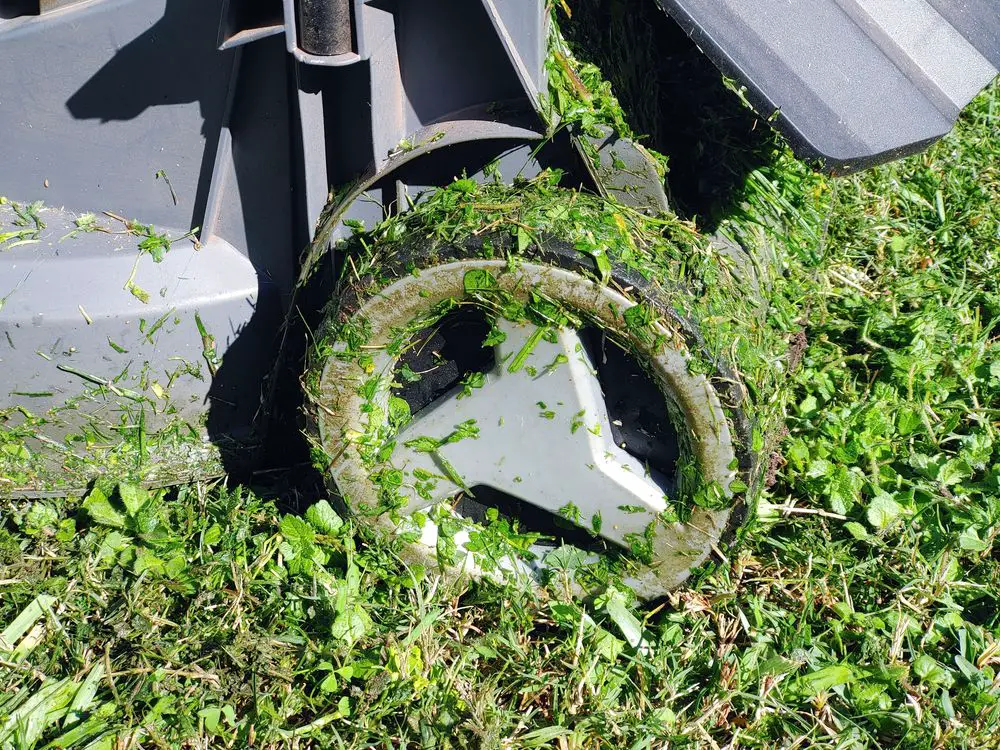In most homes, a lawnmower is a piece of essential equipment, especially if you have an expansive lawn that requires regular maintenance.
A lawnmower is designed as a piece of outdoor gear. Sadly, it does not work well around water, raising a few concerns for many homeowners out there.
If you are wondering – is it okay for a lawnmower to get wet? The answer is – yes. Minimal exposure to water can be acceptable, but it should not be thoroughly soaked. Exposure to a shower or drizzle should not cause any issues.
The next question that will surely come into mind is when it is too wet and what to do if that happens? I will share below tips on what you need to know and what you must do if your lawnmower gets wet.
Are Lawn Mowers Waterproof?
Even today, there is no lawnmower out there in the market that is entirely waterproof. Any equipment labeled as waterproof can still end up with damage after exposure to large amounts of water.
Today, the latest models of lawnmowers are often equipped with specialized covers that protect them from different hazards. Remember, though, that most of these unique covers are sold separately. Additionally, it would be best to look for one that fits your specific model since there is no one-size-fits-all cover.
are often equipped with specialized covers that protect them from different hazards. Remember, though, that most of these unique covers are sold separately. Additionally, it would be best to look for one that fits your specific model since there is no one-size-fits-all cover.
In some instances, even if your lawnmower is not waterproof, you can still clean it with water. I highly recommend allowing the engine to cool down for a while before cleaning your lawnmower with water.
It is important to note that lawnmowers do not usually have operation problems unless you used them for mowing soaked grass, which is not advisable in any way.
Your lawnmower can get wet in various ways. Let us check out ways in which your lawnmower can end up wet here:
- If you leave it outside overnight or under the rain
- Exposure to the morning dew
- Mowing the lawn after a heavy rain

- Prolonged storage of the lawnmower under plastic sheets will expose it to condensation.
- The presence of dents or cracks in the fuel tank or deck will expose parts of the lawnmower to moisture.
- Water is introduced if fuel is present for a long time without a fuel stabilizer.
Can Electric Mowers Get Wet?
If you have an electric lawnmower, you might be wondering if it is still safe to use once it gets wet. Always remember that no lawnmower is entirely waterproof. Any equipment, including lawnmowers, can end up with damage if exposed to large amounts of water.
If you check in the instruction manual of an electric lawnmower, most warn to avoid using it in wet or damp grass or during rain. Remember that using an electric device while raining is dangerous to the device and can put you at risk for injury.
When storing your lawnmower, you should not leave it outside. In case you don’t have any space, and therefore leaving it outside is the only option, at least make sure that it’s elevated to prevent it from directly sitting on the ground. It must have air to circulate it to keep it dry.
Generally, exposing your lawnmower to light rain will not cause any harm. However, if you want to prevent rust formation, you should cover it with a canvas tarp. I do not recommend plastic tarp since it retains moisture.
Which Parts Of A Lawnmower Can Get Wet?
Please note that almost all parts of a lawnmower can end up wet, depending on the situation. In most instances, some of the sensitive features include the following:
- Spark plug
- Air filter
- Carburetor and fuel tank
The other parts of the lawnmower, such as the deck, wheels, and push handle, can be exposed to water, but they are not prone to severe issues aside from the formation of rust after continuous exposure.
Remember that the extent can vary on the severity of the weather conditions in your area.
Can You Mow The Wet Lawn?
When your lawn is wet, do not mow the grass. The surface is slippery while the grass clumps up and clogs the mower. I strongly advise against mowing a damp lawn.
Occasionally, there might be times when you don’t have a choice. If it’s been raining for weeks or if you’ve been away from home and the lawn is out of shape, you have no other choice but to mow the lawn.
If you are facing this ordeal, there are considerations to bear in mind:
- Check first if the mower blades are sharp. If your mower blades’ edges are sharp, it keeps the grass healthy with a crisp cut. It is vital to have a sharp blade when cutting wet grass since it might shred instead of being cut.
- Shift to a slower speed to lessen the strain on your lawnmower.
- Make sure that you have a clean deck on the underside. If your deck is packed up, it can result in problems if you are going to mow wet grass. I suggest looking for a product that you can spray on the deck’s underside to prevent the grass from sticking.
- Raise the mower deck. You should mow at 3 ½ inches, but some cut lower, which is not advisable. When mowing wet grass, do it between 3 and 4 inches. Take note that your lawnmower cannot handle cutting too low in wet conditions.
- Utilize a side-discharge and rake up the clippings or mow again once they are dry using a mulcher or bagger. When you trim in a day or two, it helps break down any clumps, and you can lower the height of the grass if it was relatively high.
- As for the fuel, I suggest using a stabilizer and only buying fuel that is good for a few weeks of mowing. With this approach, it can prevent contamination if exposed to wet grass.
- After mowing, clean under the mower deck along with the blade to prevent clippings or clumps from sticking and allowing mold formation, do not forget to clean the tires and wipe the top of the mower.
Can you cut the grass while raining?
If you wonder whether it is okay to mow the lawn while raining – it all depends on your situation, and it requires inspection of your grass.
while raining – it all depends on your situation, and it requires inspection of your grass.
When the lawn is excessively wet, it is not the right time to mow your lawn since the grass blades are likely to be lying flat. Since the soil under the grass is completely soaked, the mower might move sideways due to skidding. Additionally, the grass also moves, thus resulting in long term ruts.
blades are likely to be lying flat. Since the soil under the grass is completely soaked, the mower might move sideways due to skidding. Additionally, the grass also moves, thus resulting in long term ruts.
I do not advise cutting the grass while raining since it disrupts the proper process of trimming. You will either cut excessively or too little in which the outcome is untidy. It also increases the risk of spreading plant diseases if present and compacting the soil further.
If the rain does not stop you from mowing the lawn, you should ensure that the grass blades are erect to prevent these problems. Do not forget to clean the bottom of the lawnmower before and after mowing.
Useful tips on what to do when your lawnmower gets wet?
Mishaps can occur, and your lawnmower can end up wet. You either left it outside or stuck. Once this happens, stay calm and consider these tips on what you should do if your lawnmower gets wet.
- Do not position the lawnmower on its side. Doing this will allow the oil to spill out. You should spray starter fluid into the carburetor and try to switch on the engine. The reason for this is to help with the drying process. Once you successfully start the engine, allow it to run for a few minutes, even if it produces unusual sounds.
- Turn off the engine and remove the air filter. Thoroughly clean the air filter and leave it to dry out before putting it back.
- If you’re having difficulty starting the engine, an option is to drain the oil and gas. In some instances, the spark plug might be damaged due to moisture. The solution for a damaged spark plug is to replace it with a new one.
- Do not forget to inspect the coil since it might have rust due to the moisture. If rust is present, take out the coil and clean using a wire brush and sandpaper.
- If you tend to use your lawnmower during wet conditions or left it out under the rain, rust is likely to form. To prevent rust, apply rust protection.
Final Thoughts on Can Lawnmowers Get Wet? Three Tips On What To Do When A Mower Gets Wet.
At this point, you now have a clear idea of what to do in case your lawn mower gets wet. Whether or not you are obliged to mow your lawn
gets wet. Whether or not you are obliged to mow your lawn while raining or must leave your mower outside in inclement weather, it will likely not cause significant damage unless it’s completely water-logged.
while raining or must leave your mower outside in inclement weather, it will likely not cause significant damage unless it’s completely water-logged.
With the right care and maintenance, you can keep your lawnmower in good shape even if it gets wet once in a while.

